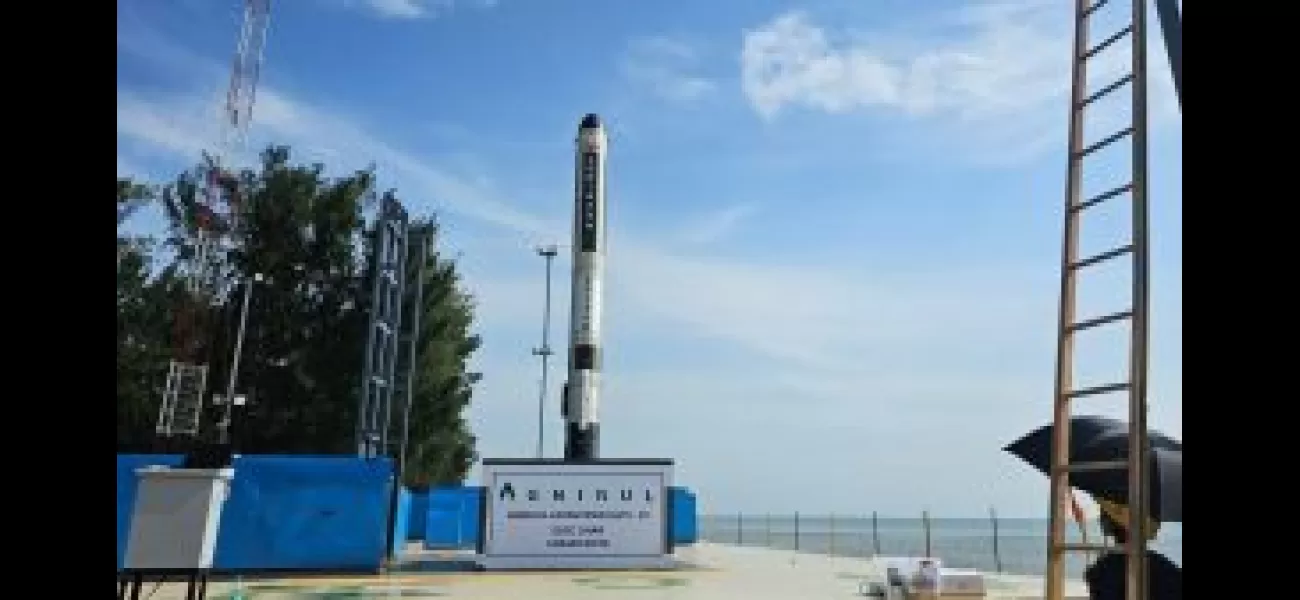Agnikul successfully tests Agnibaan rocket with sub-orbital flight.
Agnikul Cosmos, a space start-up in Chennai, successfully launched its home-built rocket Agnibaan from its own launch pad in Sriharikota, making it India's second private entity to do so.
May 30th 2024.

On Thursday, a Chennai-based space start-up called Agnikul Cosmos achieved a major milestone in India's private space sector. They successfully conducted a sub-orbital test-flight of their 3D-printed semi-cryogenic rocket, known as Agnibaan, from their very own launch pad at Sriharikota. This makes them the second private entity in India to achieve this feat.
After four unsuccessful attempts, the test flight finally took place at 7:15 am on Thursday. It was a controlled vertical ascent flight that met all the mission objectives and performed well. The launch took place in the presence of a few dignitaries at the Sriharikota launch pad, which is located within ISRO's Satish Dhawan Space Centre. There was no live streaming of the event.
Agnikul Cosmos shared the news of their successful launch on social media, stating that they were humbled by the achievement. They also mentioned that this was India's first and only private launch pad within SDSC-SHAR at Sriharikota. The rocket, which was completely designed in-house, was powered by the world's first single piece 3D printed engine. It also happened to be India's first flight with a semi-cryo engine.
The start-up is now looking towards flying an orbital mission by the end of the financial year 2025. Another private Indian entity, Skyroot Aerospace, had previously launched its sub-orbital rocket Vikram-S in November 2022. This success has brought immense pride to India's space sector and has motivated ISRO to support space startups and non-governmental entities for innovation and to create a vibrant space ecosystem in the country.
The successful launch of Agnibaan SOrTeD is a historic moment for India's space sector, according to Pawan Goenka, the Chairman of space regulator Indian National Space Promotion and Authorisation Centre. He praised Agnikul Cosmos for their contribution to the growing space sector in India. This was the fifth attempt by Agnikul to launch the Agnibaan SOrTeD since March 22, with the previous attempts being called off due to technical difficulties.
The team behind Agnikul consists of over 200 engineers and is associated with the National Centre for Combustion Research and Development at IIT Madras. They are also guided by 45 former scientists from ISRO. The rocket, which is a customisable two-stage launch vehicle, can carry a payload of up to 300 kg into orbit. It uses a semi-cryogenic engine with a mix of liquid and gas propellants, a technology that has not yet been demonstrated by ISRO in any of its rockets.
The SOrTeD mission is a single-stage launch vehicle demonstration that is powered by a semi-cryogenic engine called Agnilet. This engine uses sub-cooled liquid oxygen as its propellant and has been developed indigenously. The start-up has also developed the first-ever ethernet-based avionics architecture and autopilot software from India. The vehicle is equipped with four carbon composite fins for passive control and is powered by sub-cooled Liquid Oxygen and Aviation Turbine Fuel.
The Agnilet engine used in this mission is the world's first single-piece 3D-printed semi-cryogenic rocket engine. The entire mission is expected to last just over two minutes, from launch to splashdown. The launch vehicle will perform several manoeuvres, including a pitch-over manoeuvre and a wind-biasing manoeuvre, before reaching its apogee and splashing down, marking the completion of the mission. This achievement is a huge boost for India's thriving private space industry and a glimpse into the future of space exploration.
After four unsuccessful attempts, the test flight finally took place at 7:15 am on Thursday. It was a controlled vertical ascent flight that met all the mission objectives and performed well. The launch took place in the presence of a few dignitaries at the Sriharikota launch pad, which is located within ISRO's Satish Dhawan Space Centre. There was no live streaming of the event.
Agnikul Cosmos shared the news of their successful launch on social media, stating that they were humbled by the achievement. They also mentioned that this was India's first and only private launch pad within SDSC-SHAR at Sriharikota. The rocket, which was completely designed in-house, was powered by the world's first single piece 3D printed engine. It also happened to be India's first flight with a semi-cryo engine.
The start-up is now looking towards flying an orbital mission by the end of the financial year 2025. Another private Indian entity, Skyroot Aerospace, had previously launched its sub-orbital rocket Vikram-S in November 2022. This success has brought immense pride to India's space sector and has motivated ISRO to support space startups and non-governmental entities for innovation and to create a vibrant space ecosystem in the country.
The successful launch of Agnibaan SOrTeD is a historic moment for India's space sector, according to Pawan Goenka, the Chairman of space regulator Indian National Space Promotion and Authorisation Centre. He praised Agnikul Cosmos for their contribution to the growing space sector in India. This was the fifth attempt by Agnikul to launch the Agnibaan SOrTeD since March 22, with the previous attempts being called off due to technical difficulties.
The team behind Agnikul consists of over 200 engineers and is associated with the National Centre for Combustion Research and Development at IIT Madras. They are also guided by 45 former scientists from ISRO. The rocket, which is a customisable two-stage launch vehicle, can carry a payload of up to 300 kg into orbit. It uses a semi-cryogenic engine with a mix of liquid and gas propellants, a technology that has not yet been demonstrated by ISRO in any of its rockets.
The SOrTeD mission is a single-stage launch vehicle demonstration that is powered by a semi-cryogenic engine called Agnilet. This engine uses sub-cooled liquid oxygen as its propellant and has been developed indigenously. The start-up has also developed the first-ever ethernet-based avionics architecture and autopilot software from India. The vehicle is equipped with four carbon composite fins for passive control and is powered by sub-cooled Liquid Oxygen and Aviation Turbine Fuel.
The Agnilet engine used in this mission is the world's first single-piece 3D-printed semi-cryogenic rocket engine. The entire mission is expected to last just over two minutes, from launch to splashdown. The launch vehicle will perform several manoeuvres, including a pitch-over manoeuvre and a wind-biasing manoeuvre, before reaching its apogee and splashing down, marking the completion of the mission. This achievement is a huge boost for India's thriving private space industry and a glimpse into the future of space exploration.
[This article has been trending online recently and has been generated with AI. Your feed is customized.]
[Generative AI is experimental.]
0
0
Submit Comment





